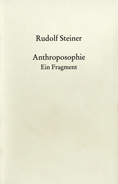Anthroposophy,
A Fragment from 1910,
Anthroposophie.
Ein Fragment aus dem Jahre 1910.
Rudolf Steiner
(Written 1910; Bn 45 / GA 45)
| |

|
Click to Visit the Verlag
|
This text, outlining a new methodology for the study of human nature,
dates from 1910 and was found after Rudolf Steiner's death among his
unpublished papers. Steiner had dealt with the same theme earlier in
lectures. Asked for a written version, he tried to write down what he
had said, but found himself unable to do so — the language would
not completely relinquish the words. Nevertheless, what he was able to
put down remains a major intellectual and spiritual accomplishment of
the twentieth century. Steiner presents anthroposophy, which lies
between anthropology and theosophy, as a way of studying the human
being. Where anthropology studies the human being on the basis of the
senses — i.e. by observation within the limits of the scientific
method — theosophy recognizes the human as a spiritual being on
the basis of inner experience and seeks to understand what it means to
be human in a spiritual world. Between these two approaches —
basically those of science and religion — lies anthroposophy,
which seeks to study human beings as they present themselves to physical
observation, while at the same time seeking to derive indications of
the spiritual foundations of phenomena by a process of phenomenological
intensification. The results of such phenomenological intensification,
though fragmentary and incomplete, are of enormous importance. They
constitute the first steps toward a truly cognitive psychology, one
that demonstrates the richness of the phenomenological approach to the
human being as a sensory organism. Starting from there, Steiner unfolds
the seven life processes, the nature of I-experience, the meaning of the
human form, and its complex relation to higher spiritual worlds. This is
a key work, whose time has truly arrived.
Chapter titles in this book are:
The Character of Anthroposophy
The Human Being as a Sensory Organ
The World Underlying the Senses
The Life Processes
I-Experience
The World Underlying the Sense Organs
The World Underlying the Organs of Life
The Higher Spiritual World
The Human Form
Known Publications:
- Anthroposophie, Ein Fragment aus dem Jahre 1910,
German language editions: 1980,
ISBN
3-7274-0450-7,
 2002,
ISBN
3-7274-0452-3,
2002,
ISBN
3-7274-0452-3,
- Bn 45.1.01 The Character of Anthroposophy,
- Bn 45.1.02 The Human Being as a Sensory Organ,
- Bn 45.1.03 The World Underlying the Senses,
- Bn 45.1.04 The Life Processes,
- Bn 45.1.05 Processes in the Inner Human Being,
- Bn 45.1.06 I-Experience,
- Bn 45.1.07 The World Underlying the Sense Organs,
- Bn 45.1.08 The World Underlying the Organs of Life,
- Bn 45.1.09 The Higher Spiritual World,
- Bn 45.1.10 The Human Form,
- Bn 45.2.01 Appendix to Chapter 3,
- Bn 45.2.02 Appendix to Chapter 6,
- Bn 45.2.03 Appendix to Chapter 10,
- Bn 45.2.04 Appendix, “notes”,
- Bn 45.2.05 Appendix on “Epistemological Studies”,
- Bn 45 Anthroposophy, a Fragment,
10 Chapters and 5 Appendices, as above,
1996 Anthroposophic Press, New York,
translator: Catherine E. Creeger
ISBN
0-88010-401-5,
 Paper. Paper.
Bn 45 / GA 45 ... Selections ...
-
-
 With this script, which he could not bring to a conclusion, Rudolf
Steiner proposed a representation of a sense of teaching people from
the research results of anthroposophy.
With this script, which he could not bring to a conclusion, Rudolf
Steiner proposed a representation of a sense of teaching people from
the research results of anthroposophy.
|
|
|
|